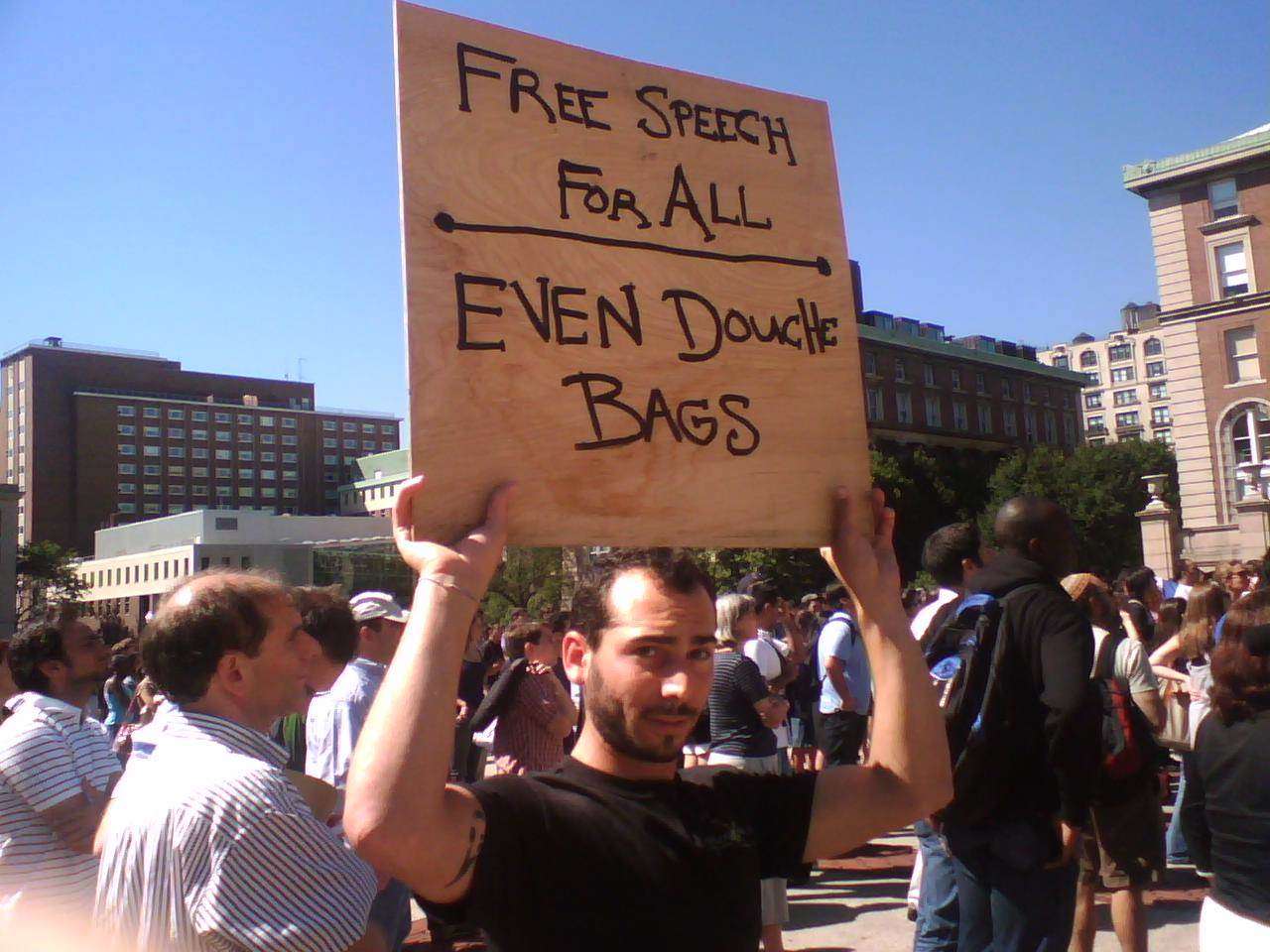Actually, Senators, You're the Ones Who Threaten the Country
Americans' right to free speech should not be proportionate to their political power.


We are, as it always seems, "at a pivotal moment in American history." At least that's what Sens. Tom Udall and Bernie Sanders maintained in a melodramatic Politico op-ed last week as they explained their efforts to repeal the First Amendment.
Let me retort in their language:
It's true that building the United States has been long, arduous and rife with setbacks. But throughout the years, the American people have repelled efforts to weaken or dismantle the First Amendment. We have weathered the Sedition Act of 1918, a law that led to the imprisonment of innocent Americans who opposed the war or the draft. Since then, we have withstood numerous efforts to hamper, chill, and undermine basic free expression in the name of "patriotism." We have, however, allowed elected officials to treat citizens as if they were children by arbitrarily imposing strict limits on their free speech in the name of "fairness."
But nowadays, after five members of the Supreme Court upheld the First Amendment and treated all political speech equally, liberal activists and Democrats in the Senate would have us return to a time when government dispensed speech to favored institutions—as if it were the government's to give.
In 2010, the Supreme Court issued a 5-4 opinion striking down major parts of a 2002 campaign-finance reform law in Citizens United v. Federal Election Commission. This case and subsequent rulings, including McCutcheon v. FEC, have led to more political activism and more grass-roots engagement than ever before. In the 2012 presidential election, we quickly saw the results. More Americans voted than in any election; more minorities voted; more Americans engaged in more debate and had more information in their hands than ever before. More than 60 percent of all those super PAC funds came from just 159 donors, each of whom gave more than $1 million. And still, every vote held the same sway. You may be convinced by someone, but no one can buy your vote. I wish the same could be said for your senators.
Even less worrisome is the propaganda surrounding scary-sounding "dark money"—dollars spent by groups that do not have to disclose their funding sources. The 2012 elections saw almost $300 million spent on engagement in our democratic institutions, and the 2014 midterm elections could see as much as $1 billion invested in political debate. That means more democratization of media and more challenges to a media infrastructure that once managed what news we were allowed to consume. Still, no one can buy your vote.
No single issue is more important to the needs of average Americans than upholding the Constitution over the vagaries of contemporary political life. The people elected to office should be responsive to the needs of their constituents. They should also be prepared to be challenged. But mostly, they should uphold their oath to protect the Constitution rather than find ways to undermine it.
When the Supreme Court finds, for purposes of the First Amendment, that corporations are people, that writing checks from the company's bank account is constitutionally protected speech, and that attempts to impose coercive restrictions on political debate are unconstitutional, we realize that we live in a republic that isn't always fair but is, for the most part, always free.
Americans' right to free speech should not be proportionate to their political power. This is why it's vital to stop senators from imposing capricious limits on Americans.
It is true that 16 states and the District of Columbia, along with more than 500 cities and towns, have passed resolutions calling on Congress to reinstitute restriction on free speech. Polls consistently show that the majority of Americans support the abolishment of super PACs. So it's important to remember that one of the many reasons the Founding Fathers offered us the Constitution was to offer a bulwark against "democracy." Senators may have an unhealthy obsession with the democratic process, and Supreme Court justices are on the bench for life for that very reason.
On Monday, Democrats offered an amendment to repeal the First Amendment in an attempt to protect their own political power. Whiny senators—most of them patrons to corporate power and special interests—engaged in one of the most cynical abuses of their power in recent memory. Those who treat Americans as if they were hapless proles unable to withstand the power of a television commercial are the ones who fear speech. That's not what the American republic is all about.
Editor's note: The proposed amendment went down to a well-deserved defeat in the Senate yesterday.
Editor's Note: As of February 29, 2024, commenting privileges on reason.com posts are limited to Reason Plus subscribers. Past commenters are grandfathered in for a temporary period. Subscribe here to preserve your ability to comment. Your Reason Plus subscription also gives you an ad-free version of reason.com, along with full access to the digital edition and archives of Reason magazine. We request that comments be civil and on-topic. We do not moderate or assume any responsibility for comments, which are owned by the readers who post them. Comments do not represent the views of reason.com or Reason Foundation. We reserve the right to delete any comment and ban commenters for any reason at any time. Comments may only be edited within 5 minutes of posting. Report abuses.
Please to post comments


Those who have a perverse desire to see not only themselves, but all the other little people in shackles have become very bold, and there are a lot of them. This country is overrun with fearful fools bent on vengeance for make-believe crimes.
The purpose of politicians calling for limits on free speech is to protect their incumbency. Period.
Where is the ACLU, that protector of the 1st?
**crickets**
From the ACLU website:
"The ACLU believes that the system of electing candidates to federal office badly needs repair. And we will continue to advocate reform of the current system ? such as our longstanding support for full public financing ? but in doing so we will stress fidelity to the principles protected by the First Amendment with the goal of expanding, not limiting, political speech."
Not crickets - opposition, rightly.
It'll be interesting to hear the ACLU explain how campaigns can be "fully publicly financed" without shutting down private contributions, including
cash, in-kind, or advertising.
Is this the BHO equivalent of FDR's Court-packing?
Nah. He did that already when he recess-appointed new judges to the DC Circuit.
So, here is the question.
In passing a motion to amend the First Amendment, would not the United States Congress be itself making a "law respecting an establishment of religion" or "abridging the freedom of speech", or "of the press"; or "the right of the people peaceably to assemble", and "to petition the Government for a redress of grievances".
In other words, would they not be violating the First Amendment?
My position is, that short of a Constitutional Convention to completely rewrite the thing, neither the Congress not the States can do anything about the Bill of Rights.
The fact is that the Bill of Rights does not simply lay out procedures and methods of governance, it spells out an absolute minimum and unchangeable set of rights of the people and hence limitations on the power of government over said people.
Show me I am wrong, if you can.
Procedurally, from a positive law perspective, the entire BOR could be repealed via the amendment process.
this. The only way to violate it (without facing POSSIBLE judicial scrutiny) is by amendment. The court has allowed many instances of constitutionally dubious law , absent an amendment, but that don't make it right.
By taking the first step (Congressional approval) for repealing the BOR, Congress hasn't actually made a law. That doesn't happen until final ratification, at which point the Constitutional provisions that might be violated are repealed.
Don't think so, Isaac. Amending it merely changes how it is defined. In essence, the Team Red proposal would merely have granted them the power to do as they wish. It would take a further enactment to actually abridge Freedom of Speech.
IOW, enabling the violation is not the same as actually doing it.
TBS, I am appalled that the MSM are not calling for the heads of Franken and all of those who voted in favor.
The MSM has a rent-seeking exclusion protecting Freedom of the Press.
That all depends, of course, on how future Congresses define "The Press." But talking heads aren't subtle enough to understand that they're laying theirs on the chopping block.
Here's a general rule of thumb for people: whatever the problem you want to solve is, no matter how legitimate and pressing, if your proposed solution is "let's violate and/or gut the First Amendment", you need to go back to the drawing board and think of a different approach.
For many people, the First Amendment IS the problem.
Democrats looking to destroy freedom of speech, color me totally fucking shocked.
The ironically amazing part of all this hullabaloo is how many 501(c)(4) corporations are mounting full-court political campaigns in favor of a Constitutional Amendment against eevul corprations that would gut the ability of 501(c)(4) corporations to mount even half-court political campaigns.
They don't even know they're in a circular firing squad.